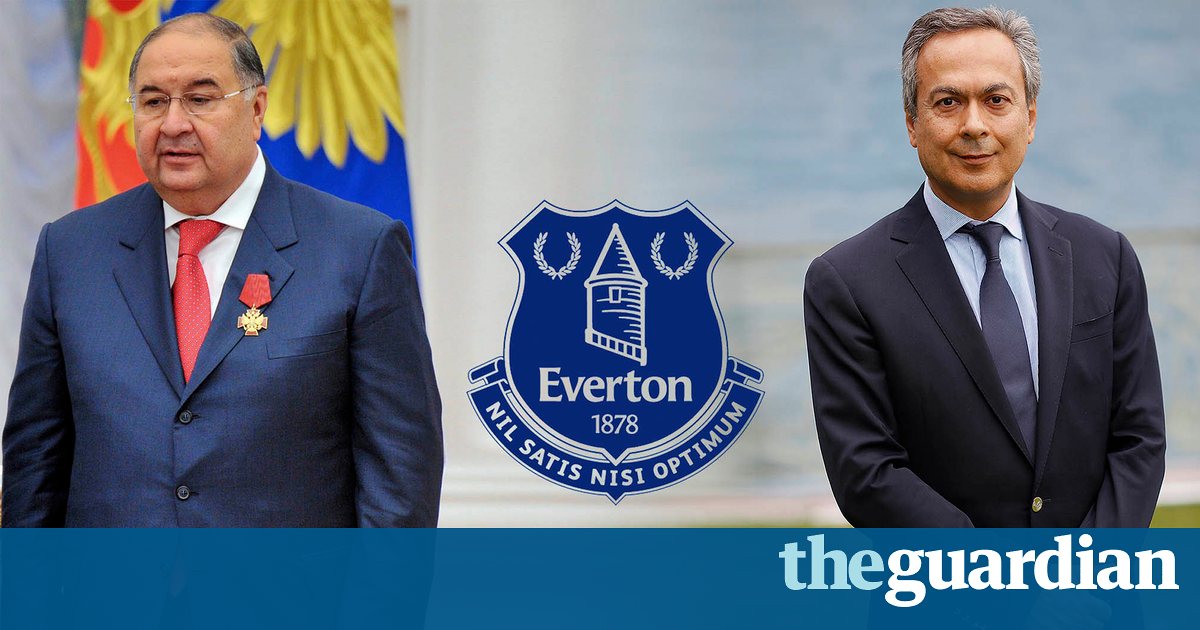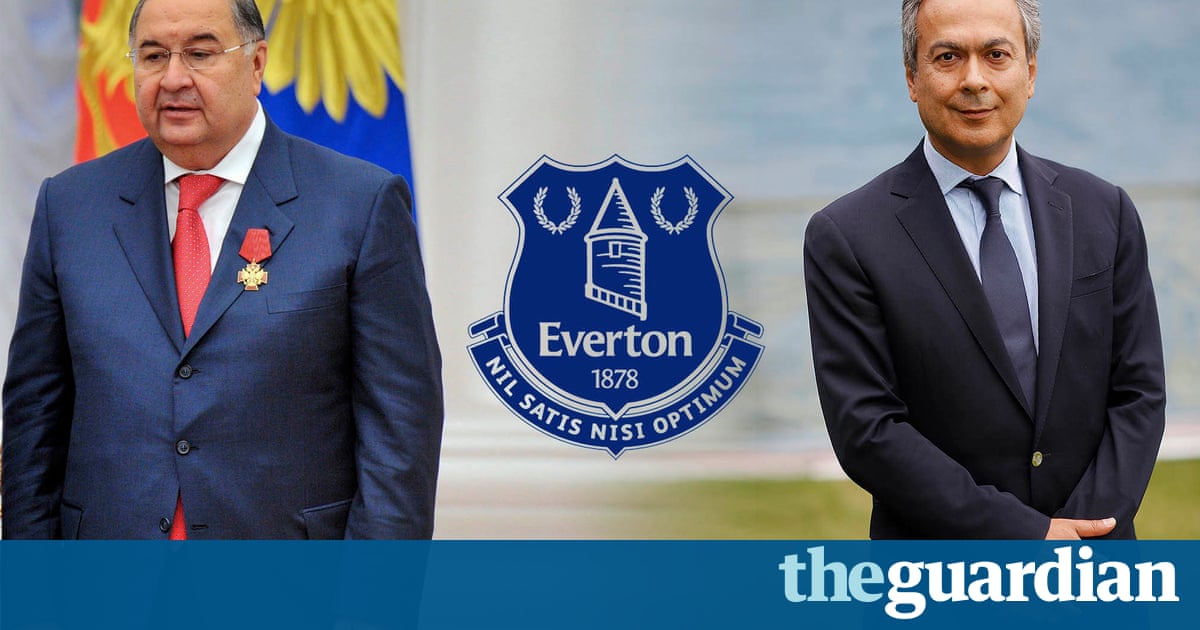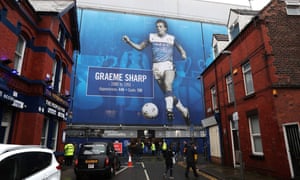The curious case of Farhad Moshiri, Alisher Usmanov and new money at Everton | David Conn

Alisher Usmanov, who has a stake in Arsenal, is said not to be involved at Everton but the heavy investment by USM, of which the Uzbek-Russian billionaire owns 48%, in Finch Farm has raised questions

When Evertons major shareholders concluded years of searching for a mega-rich owner by selling just under 50% of the club to Farhad Moshiri for 87.5m last February, it was widely assumed Moshiris senior business partner, the Uzbek-Russian billionaire Alisher Usmanov, must be looming large behind him.
Usmanov, though, has a 30% stake in Arsenal, the club he harbours an appetite to buy, but where he has been held at bay and arms length by the US investor Stan Kroenke, who owns 67% and is buttressed by the alliances of the board. Premier League rules prohibiting dual ownership, aimed at maintaining proper competition, forbid a person who owns more than 10% of one club to buy shares in another.
So when Moshiri bought into Everton, who have long strained financially to compete in the Premier League and pined for a new stadium, his and Usmanovs spokesman made it clear this was Moshiris venture alone and Usmanov, sticking with and committed to his stake in Arsenal, was not involved at all.
Yet the lurking question of Usmanovs position was revived by the surprise announcement at Evertons annual general meeting this month that USM, the investment company for his vast holdings in Russian mining and metals, and digital corporations, is pumping money into Everton by sponsoring the Finch Farm training ground. Everton did not reveal the value of this unusual sponsorship of a training ground, which does not attract much media exposure or TV coverage to promote a sponsors name but some sources suggested it is around 6m a year for five years.
Usmanov built up his massive holdings in former state-owned resources after the break-up of the Soviet Union and still owns 48% of USM, the investment vehicle for Metalloinvest, Russias largest mining company, the countrys Baikal copper mining company and the telecommunications operator MegaFon.
The US publication Forbes estimates his wealth from these and other assets to be $14.8bn.
Moshiri, now resident in Monaco, made his own considerable riches largely by being accountant, adviser and then junior shareholder in USM, after Usmanov sold a minority stake to the companys executives in 2014.
When Moshiri was selected by Evertons chairman, Bill Kenwright, as the magnate to buy and take the club into a more secure future, Usmanov, who watches Arsenals matches from a hospitality box at the Emirates Stadium, bought Moshiris 15% stake in Arsenal for around 146m, thereby freeing up his partner to take effective control at Goodison.
To the question now of whether Usmanov really is behind the Everton investment, given the money for the sponsorship is coming from a company which he substantially owns, a spokesman for him and Moshiri stated again this is not so, and that the two football projects are entirely separate. The spokesman said there is a purely commercial rationale for USM to sponsor Finch Farm, saying: Everton represents a great opportunity for USM to leverage for the first time the global appeal of the Premier League to promote its holdings in a number of companies and brands. As the executive chairman and significant shareholder of USM, Farhad Moshiri is uniquely placed to align the commercial interests of his group and Everton. Whilst they work together on most things, when it comes to football Farhads interest is Everton and Alisher Usmanovs is Arsenal.
Explaining what an investment company which holds, buys and sells such vast assets sees in the sponsoring of the Everton training ground, Ivan Streshinsky, a member of the USM board, said they were acquiring an extensive package of marketing rights which could provide the company with unique year-round global media exposure.
These rights include displaying the USM or other brand names on the LED boards around the Goodison Park pitch, backdrop for player and manager TV interviews, and access to Everton players for promotion purposes.
Both the Premier League and Uefa financial regulations, designed to limit clubs losses being bankrolled by wealthy owners, require sponsorship deals connected to a club owner to be for market value. That is to ensure a sponsorship is not a back-door way for an owner to pour money in, so in theory this deal could be investigated for proof it is truly commercial.
After an examination by Uefa of Manchester Citys deals with a roster of companies based in Abu Dhabi, the country of which the clubs owner, Sheikh Mansour bin Zayed Al Nahyan, is a member of the ruling family, City agreed in May 2014 not to improve the financial terms of two second-tier partnerships, despite maintaining that they represent market value.
At Stoke City the clubs owners, Peter Coates and his family, also own the online gambling powerhouse bet365, which now sponsors the stadium as well as the club shirt.
But Premier League rules on market value would only be applied at all if clubs would otherwise have made losses beyond the currently permitted 105m total over three seasons, and given the new 8bn TV deals for 2016-19 Everton, like Stoke, are not expected to fall anywhere close to that category. Neither club are playing in Uefa competitions so the auditors at European footballs governing bodys headquarters by Lake Geneva will not be descending on the Everton or Stoke accounts for now. Even if they do, both clubs are confident their sponsorships, although by companies in effect owned or run by their owners, fall within the boundaries of market value.

Moshiri, as revealed by Everton in financial figures published for the AGM, has already made a loan to the club, interest-free, of 80m, to pay off 55m of other loans and provide some money for operations. Some Everton sources say he has paid some more in this month to facilitate signing players in this transfer window, with at least one more signing expected for Ronald Koeman following the acquisitions of Morgan Schneiderlin, for 20m from Manchester United, and Ademola Lookman, 11m from Charlton Athletic.
Kenwright, who has stayed on as chairman after selling half his 26% stake to Moshiri, is continuing to negotiate the deals to sign players.
With Moshiri and his money now behind them Everton are embarking again on a quest for a new stadium, with two failed projects, on Liverpools Kings Dock and a joint project with Tesco in Kirkby, behind them in the last 20 years. This time, while the chief executive, Robert Elstone, has said three options are under consideration, the favoured choice is to build a 50,000-seat stadium on the north Liverpool waterside, at Bramley-Moore dock.
The land, which is owned by the ubiquitous north-west developer Peel Holdings, would have to be bought by Everton, and its development value as a key part of a wider regeneration project makes it more expensive as well as mostattractive.
The discussion within Everton is that the new stadium could cost around 300m, which would mostly have to be borrowed. Elstone and his team are tasked with examining how that would pay for itself in increased ticket sales, much more hospitality than in the hemmed-in, grand confines of Goodison, and possible naming rights.
Unlike other clubs, including Manchester City and West Ham United, whose stadiums were built and converted for them with public and lottery money following the 2002 Commonwealth Games and 2012 Olympics respectively, Swansea City and Hull City whose local councils built their new grounds, and Arsenal, who made multi-millions on property development at and around Highbury, Everton have no windfall to help them finance a newstadium.
Liverpools mayor, Joe Anderson, told the Guardian he wants to examine whether the council could help, perhaps in conjunction with a bid to host the 2026 Commonwealth Games.
Liverpool city council, which will in March decide how to make a further 90m cuts to its budget, on top of 330m taken out of its budget since the Conservative-Liberal Democrat coalition government came to power in 2010, has been seeking ways to generate money by borrowing at low rates and renting assets commercially. In 2013 the council bought Finch Farm from its then landlord for 14m and the rent from Everton, which is 860,000 currently, makes a 200,000 annual profit for the council. Everton havent directly asked us for any financial contribution, Anderson said. But a stadium in that area will be very important for the regeneration of north Liverpool, and if it benefits the city financially, well do it.
Everton are pressing on with assessing the economics and practicalities of this next push to leave their historic home at Goodison, which was Englands first purpose-built football ground when it opened in 1892. The club and its new owner hope to reach a decision by the end of this 2016-17 season, 125 years later, on the next stage for its future.